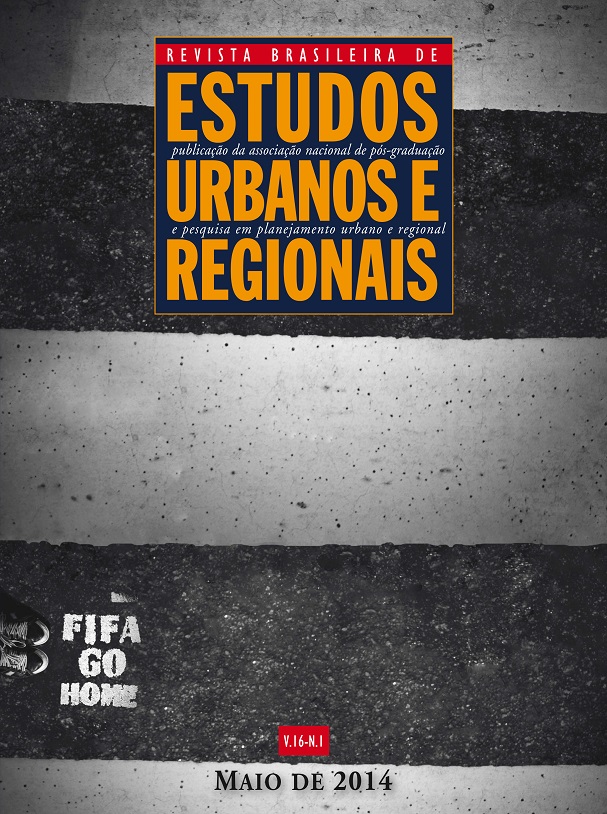Políticas de renovação e regeneração urbana em Liverpool, Inglaterra: a construção de uma distopia urbana através de parcerias público-privadas
DOI:
https://doi.org/10.22296/2317-1529.2014v16n1p67Keywords:
políticas urbanas (neo)liberais, privatização do espaço público, cidade monolítica, limpeza social, capitalismo predatório.Abstract
O artigo aborda os principais projetos de renovação e regeneração urbana de Liverpool, Inglaterra, desde os anos 1980, dentro de um quadro no qual esse tipo de política assume crescente importância na agenda pública. Seu principal objetivo é compreender a lógica e os resultados advindos desses projetos, que respondem ao (novo) papel do Estado, à reestruturação econômica e à ascensão de políticas macroeconômicas (neo)liberais. Avalia-se que eles criaram espaços espetaculares e “utópicos,” tendo sido bem sucedidos em seus próprios termos, mas que, em conjunto, formam uma urbanidade distópica, marcada pela transformação de espaços públicos em privados, criação de uma cidade monolítica, através de processos de limpeza social, e adoção de princípios (neo)liberais na gestão urbana.
Downloads
References
BARNEKOV, T.; BOYLE, R.; RICH, D. Privatism and urban police in Britain and the United States. Oxford: Oxford University Press, 1989.
BELL, D. O advento da sociedade pós-industrial. Diálogo, Rio de Janeiro, v. 11, n. 2, p. 3-12, 1978.
BORJA, J.; FORN, M. Políticas da Europa e dos Estados para as cidades. Espaço & Debates, São Paulo, v. 16, n. 39, p. 32-47, 1996.
BROWN, J. Who cares? Design and diplomacy in the Pathfinder demolition zone. Architects’ Journal, London, 12 Set. 2012. Disponível em: < http://m.architectsjournal.co.uk/8635651.article >. Acesso em: 02 fev. 2014.
CHESNAIS, F. A mundialização do capital. São Paulo: Xamã, 1996.
DARAMOLA-MARTIN, A. Liverpool ONE and the transformation of a city: place branding, marketing and the catalytic effects of regeneration and culture on repositioning Liverpool. Place Branding and Public Diplomacy, Basingstoke, v. 5, n. 3, p. 301-311, nov. 2009.
ENGELS, F. A situação da classe trabalhadora na Inglaterra. São Paulo: Boitempo, 2008.
GIDDENS, A. As consequências da modernidade. São Paulo: Ed. UNESP, 1991.
HAMPF, M. T. A cidade dual: sua interpretação no sul. Arquitextos, São Paulo, v. 4, n. 047, abr. 2004. Disponível em: < http://www.vitruvius.com.br/revistas/read/arquitextos/04.047/590/pt >. Acesso em: 17 jul. 2014.
HARVEY, D. Do gerenciamento ao empresariamento: a transformação da administração urbana no capitalismo tardio. Espaço & Debates, São Paulo, v. 16, n. 39, p. 48-64, 1996.
HARVEY, D. Condição pós-moderna: uma pesquisa sobre as origens da mudança cultural. São Paulo: Edições Loyola, 2005.
HATHERLEY, O. A guide to the new ruins of Great Britain. London: Verso, 2010.
HATHERLEY, O. Liverpool’s rotting, shocking ‘housing renewal’: how did it come to this? The Guardian, London, 27 mar. 2013. Disponível em: < http://www.theguardian.com/commentisfree/2013/mar/27/liverpool-rotting-housing-renewal-Pathfinder >. Acesso em: 01 fev. 2014.
HAYLLAR, B.; GRIFFIN, T.; EDWARDS, D. (Org.). City spaces – tourist places: urban tourism precincts. Oxford: Butterworth-Heinemann, 2008.
HESELTINE, M.; LEAHY, T. Rebalancing Britain: policy or slogan? London: s.n., 2011.
HEWISON, R. The heritage industry: Britain in a climate of decline. London: Methuen, 1987.
HOUSE OF COMMONS. Housing market renewal: Pathfinders. London: The Stationery Office Limited, 2008.
JUDD, D. Promoting tourism in US cities. Tourism Management, v. 16, n. 3, p. 175-187, mai. 1995.
LITTLEFIELD, D. Liverpool ONE: remaking a city centre. Chichester: Wiley, 2009.
LIVERPOOL CITY COUNCIL. Everton Ward Profile. Liverpool: LCC, 2012a.
LIVERPOOL CITY COUNCIL. Riverside Ward Profile. Liverpool: LCC, 2012b.
LIVERPOOL VISION. Business plan 2013-2016: it’s Liverpool. Liverpool: Liverpool Vision, 2012a.
LIVERPOOL VISION Liverpool city centre: strategic investment framework 2012. Liverpool: Liverpool Vision, 2012b.
MALIENE, V.; MALYS, N.; WIGNALL, L. Brownfield regeneration: waterfront site developments in Liverpool and Cologne. Journal of Environmental and Landscape Management, Vilnius, v. 20, n. 1, p. 5-16, mar. 2012.
MANDEL, E. Late capitalism. London: NLB, 1975.
MINTON, A. What kind of world are we building? The privatisation of public space. London: RICS, 2006.
MULLER, J. Z. The mind and the market: capitalism in Western thought. New York: Anchor Books, 2002.
PARKINSON, M. et al. State of the English cities: a research study. London: Office of the Deputy Prime Minister, 2006.
SMITH, N. New globalism, new urbanism: gentrification as global urban strategy. Antipode, v. 34, n. 3, p. 427-450, jul. 2002.
SPIROU, C. The evolution of the tourism precinct. In: HAYLLAR, B.; GRIFFIN, T.; EDWARDS, D. (Org.). City spaces – tourist places: urban tourism precincts. Oxford: Butterworth-Heinemann, 2008. cap. 2, p. 19-38.
URBAN TASK FORCE. Towards a strong urban renaissance. London: Urban Task Force, 2005.
URRY, J. The tourist gaze. Second edition. London: Sage, 2002.
Downloads
Additional Files
Published
How to Cite
Issue
Section
Categories
License
Copyright (c) 2017 Revista Brasileira de Estudos Urbanos e Regionais

This work is licensed under a Creative Commons Attribution 4.0 International License.
Authors who publish in this journal agree to the following terms:
1) Authors who publish in RBEUR retain the rights to their work and assign to the journal the right to first publication, performed under the Creative Commons Attribution License that allows work to be shared and assures the recognition of authorship and of the original publication vehicle, to RBEUR.
2) Authors are free to assume additional contracts separately, for publication and non-exclusive distribution of the version of the work published in this journal (e.g., publishing in an institutional repository or as a book chapter), reaffirming the authorship and recognition of the original publication vehicle, to RBEUR.











.png)

